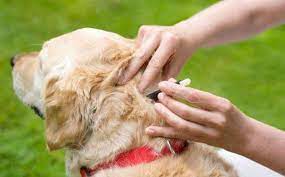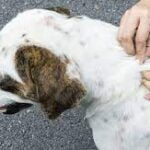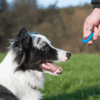How to Get Rid of Fleas on Dogs Naturally?
Does the sight of your dog scratching incessantly send shivers down your spine? Have you noticed tiny black specks jumping around your furniture, leaving you feeling itchy just by looking at them? If so, then you’re likely facing a common foe: fleas. These pesky parasites can wreak havoc on your dog’s health and well-being, causing discomfort, irritation, and even potential health risks.
But before you reach for the harsh chemical treatments, take a deep breath! This blog post is here to guide you through effective and natural ways to get rid of fleas on your dog, creating a healthy, itch-free environment for your furry friend. So, put down the spray can, grab a cup of coffee, and let’s dive into the world of natural flea control!
Do you hear that frantic scratching? See those tell-tale black specks hopping around your furniture? If you answered yes, then your furry friend might have unwelcome guests: fleas. While these tiny terrors can cause a lot of trouble, don’t despair! Before you reach for harsh chemical treatments, consider exploring natural ways to get rid of fleas on your dog.
Why Natural Solutions?
While traditional flea medications are effective, they can sometimes come with downsides:
- Chemical sensitivity: Some dogs can experience allergic reactions or skin irritation from topical flea treatments.
- Environmental impact: Chemical pesticides can harm beneficial insects and pollute the environment.
- Cost: Commercial flea treatments can be expensive, especially for larger dogs or long-term use.
Natural Methods for Flea Relief:
How to Get Rid of Fleas on Dogs Naturally? Here are 7 effective and safe natural methods to send those pesky fleas packing:
1. The Power of the Bath:
Regular baths are a great way to remove adult fleas and flea eggs from your dog’s fur. Use a gentle, dog-specific shampoo and avoid harsh human shampoos, which can dry out your dog’s skin. Here are some natural additions you can consider:
- Apple Cider Vinegar (ACV): Dilute ACV with water (50/50 mix) and add a splash to the final rinse. The acidity disrupts the flea’s lifecycle.
- Oatmeal Bath: Oatmeal soothes irritated skin caused by flea bites. Grind oatmeal into a fine powder, add it to the bathwater, and let your dog soak for 10-15 minutes.
2. Flea Combing:
This age-old method is still effective. Use a fine-toothed flea comb to remove adult fleas and their eggs from your dog’s fur. Dip the comb in a bowl of soapy water after each stroke to drown the fleas. Be thorough and focus on areas where fleas like to congregate, such as the base of the tail, behind the ears, and the groin area.
3. Essential Oils (Use with Caution!):
Certain essential oils, when used properly and diluted, can repel fleas due to their strong scent. Important note: Essential oils can be toxic to dogs if not used correctly. Always consult your veterinarian before using any essential oils on your dog and never apply them directly to their skin. If approved, dilute a few drops (usually 1-2) of a dog-safe essential oil (like lavender, lemongrass, or peppermint) in a carrier oil (like coconut oil or olive oil) and apply sparingly to your dog’s collar or bandana.
4. Diatomaceous Earth (DE):
This all-natural powder is made from fossilized algae and is effective in dehydrating and killing fleas. However, choose food-grade DE only and avoid the pool-grade variety, which can be harmful to your dog. Sprinkle a thin layer of DE on carpets, furniture, and pet bedding. Leave it for 24 hours, then vacuum thoroughly. Repeat this process every few days for a week or two.
5. Environmental Treatment:
Fleas don’t just live on your dog; they lay eggs in your home environment. To break the flea cycle, you need to treat your entire living space. Wash all bedding, blankets, and dog toys in hot water (at least 140°F). Vacuum carpets, furniture, and upholstery thoroughly, paying close attention to crevices and corners where fleas might hide. Dispose of the vacuum cleaner bag after each use.
6. Dietary Changes:
A healthy diet rich in omega-3 fatty acids can improve your dog’s skin and coat health, making them less susceptible to flea bites and irritation. Consult your veterinarian about adding fish oil or other omega-3 supplements to your dog’s diet.
7. Encourage Beneficial Insects:
Predatory mites and nematodes are natural enemies of fleas. Introducing these beneficial insects into your yard can help control flea populations in the long run. However, this method requires careful research and professional guidance to ensure you’re using the right species and avoiding unintended consequences.
Remember:
- Consistency is key: It may take several weeks of consistent treatment with a combination of these methods to completely eliminate a flea infestation.
- Monitor your dog: Keep an eye on your dog for signs of improvement and any potential allergic reactions to natural remedies.
- Consult your veterinarian: If your dog’s flea infestation is severe, consult your veterinarian for professional advice and treatment options.
By following these natural approaches, you can effectively get rid of fleas on your dog and create a healthier, happier environment for your furry companion. Remember, patience and consistency are key to winning the battle against these pesky parasites!
Conclusion
While tackling a flea infestation can feel daunting, remember, you don’t have to resort to harsh chemicals. By embracing natural remedies, consistency, and patience, you can effectively get rid of fleas on your dog and create a healthier, happier environment for both of you. Remember, consult your veterinarian if the infestation seems severe or your dog shows any adverse reactions to natural treatments. With this information and a little dedication, you can send those tiny tormentors packing and watch your furry friend thrive, itch-free and full of joy!
FAQS: How to get rid of fleas on dogs naturally?
Q: Are natural flea remedies effective?
A: While not always a quick fix, natural flea remedies can be very effective when used consistently and in combination with other methods. They offer a safer alternative to harsh chemicals for both your dog and your environment. However, for severe infestations, consulting your veterinarian for professional advice and treatment might be necessary.
Q: How long does it take for natural flea remedies to work?
A: Unfortunately, there’s no one-size-fits-all answer. The effectiveness and speed will depend on the severity of the infestation, the specific methods used, and your dog’s individual response. Be patient and consistent with your chosen methods, and you should see improvement within a few weeks.
Q: Are any essential oils safe for dogs?
A: Never apply essential oils directly to your dog’s skin as they can be toxic. Always consult your veterinarian before using any essential oils around your dog, even diluted. They can advise you on safe options and proper dilution ratios if deemed suitable for your specific case.
Q: Is Diatomaceous Earth (DE) safe for my dog?
A: Only use food-grade DE for flea control around your dog. Pool-grade DE is harmful and should never be used. When using DE, ensure proper ventilation and avoid inhaling the dust, as it can irritate the lungs.
Q: What are some signs that my dog might be allergic to a natural flea remedy?
A: If you notice any signs of skin irritation, redness, excessive scratching, breathing difficulties, or vomiting after using a natural remedy, discontinue use immediately and consult your veterinarian.
Q: Can I prevent future flea infestations?
A: Absolutely! Regular bathing, vacuuming, and using natural flea repellents like cedar chips or citronella sprays can help deter future infestations. Additionally, keeping your dog on a healthy diet rich in omega-3 fatty acids can boost their skin and coat health, making them less susceptible to flea bites.
By understanding these FAQs and following the advice in this blog, you can effectively combat fleas on your dog naturally, creating a healthier and happier environment for you and your furry companion.
Related Posts
Are Dogs Allowed In CVS?
March 22, 2024• Dog
Are Dogs Allowed in Duane Reade?
March 22, 2024• Dog
Natural Dewormers for Dogs: Safe and Effective
March 15, 2024• Dog, Dog Health
How Do I Comfort My Dog After Neutering?
March 6, 2024• Dog, Dog Health
Dog Rubs Face on Carpet: A Guide to Why
March 5, 2024• Dog














